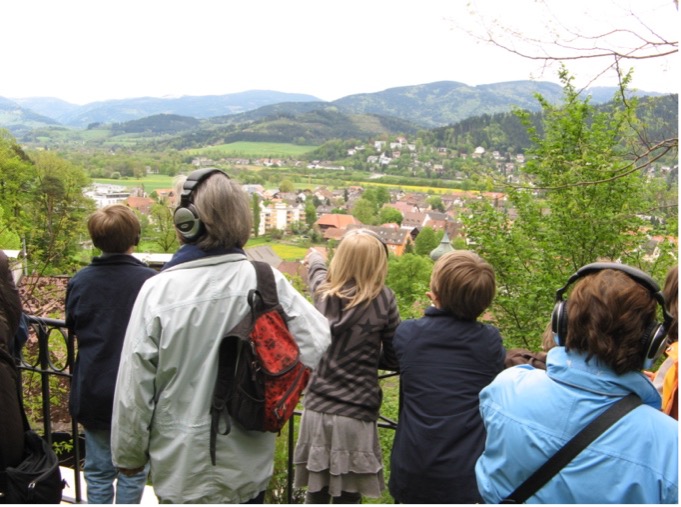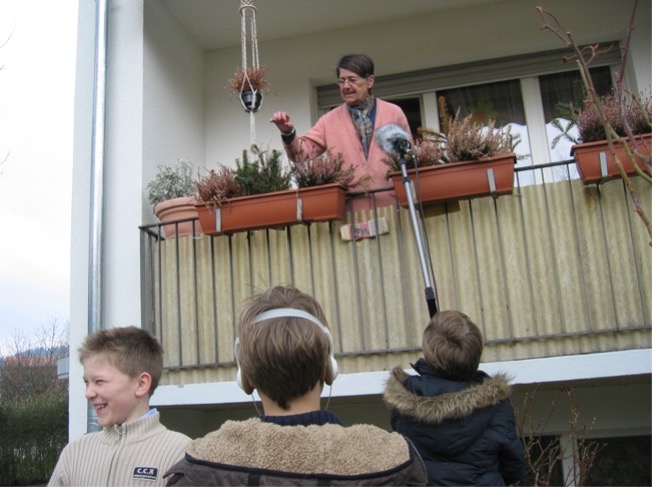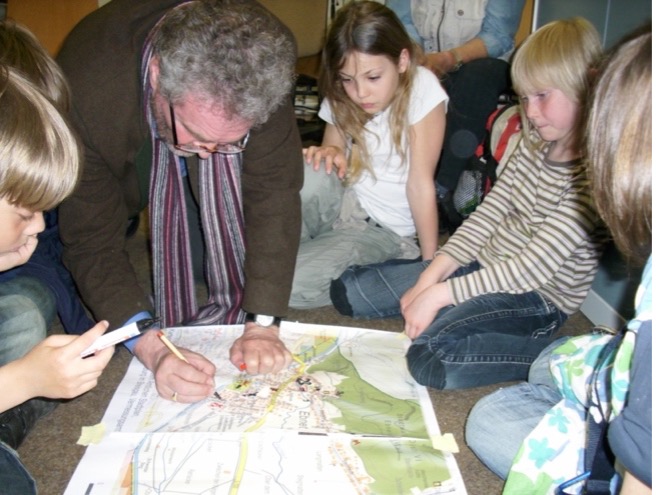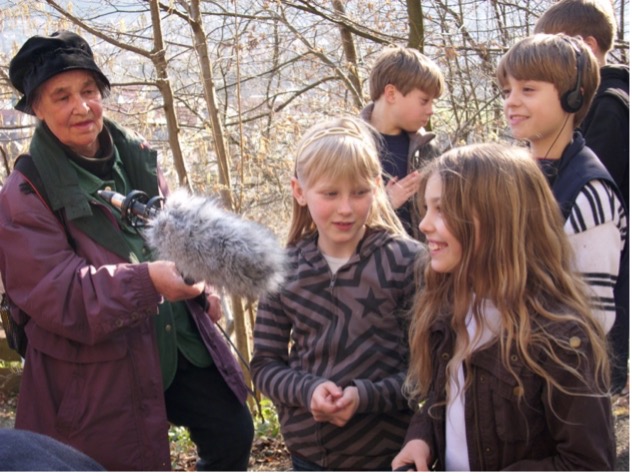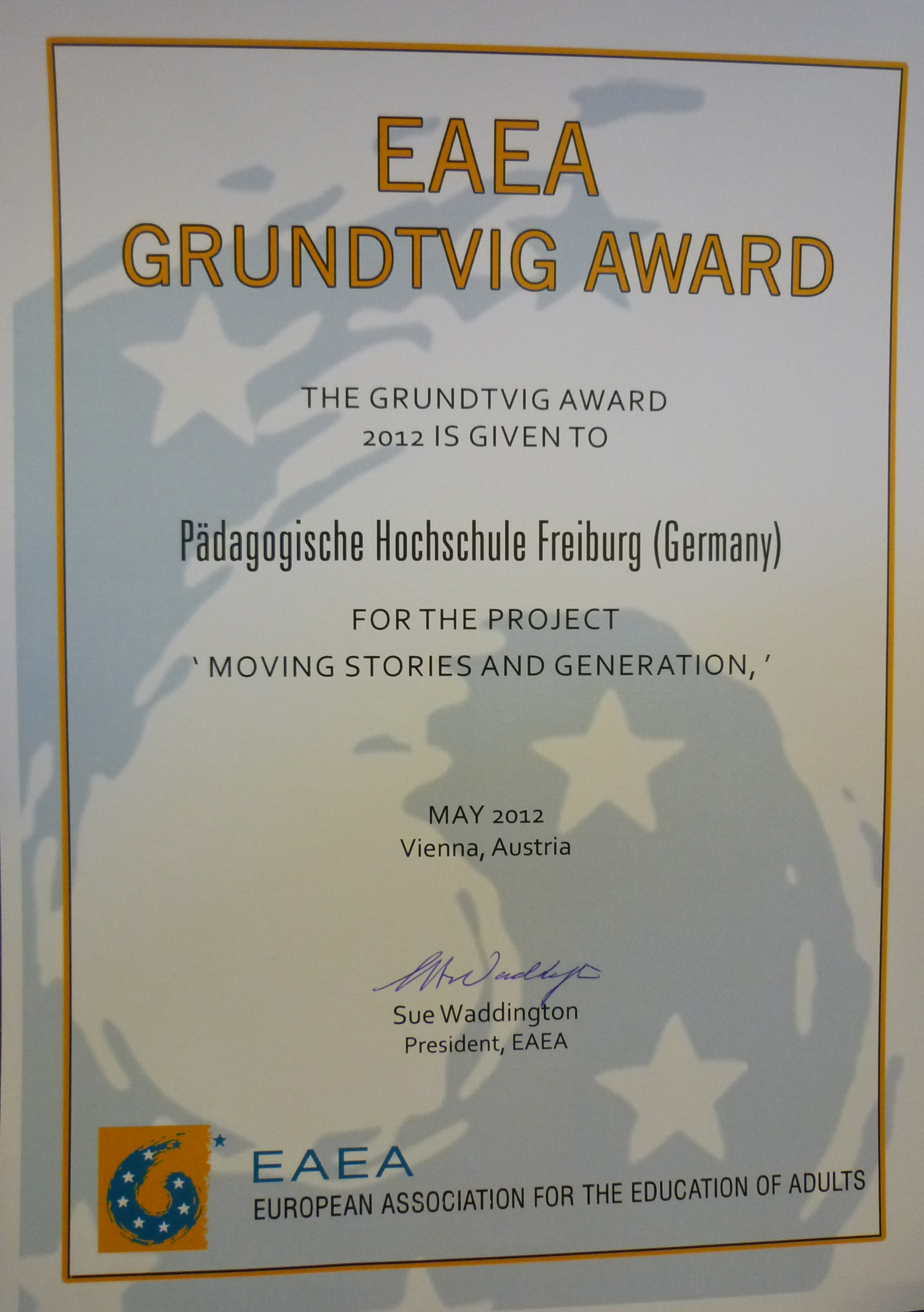
Storytelling: Gender, Migration und Austausch zwischen Generationen (2011)
Moving Stories from across borders, cultures and generations
Are you a school teacher, social worker or an adult educator?
Are you teaching students at a university? Working or volunteering in your community’s radio station or media centre, or involved in community work and interested in media and teaching?
This is a website where you can find teaching material that may suit your needs. It was produced by an international consortium of community radio stations, universities and media training projects for a project – CROSSTALK: Moving Stories across borders, cultures and generations - which aimed to reach women, senior citizens, schoolchildren, young people and migrants and give them the skills and confidence to communicate effectively and tell their stories on their local radio.
The CROSSTALK project covered three areas:
- Moving Stories and Migration
- Moving Stories and Gender
- Moving Stories and inter-generational communication
We are happy to offer these course materials for free download. Our experience is that Crosstalk’s learner-centred teaching approach in media training...
- encouraged migrants and non-locals to tell their stories and thus get better involved in community life
- helped girls and women to reflect on media representations of gender and produce their own radio shows
- introduced senior citizens and young people, through interviewing each other, to the differences and unexpected similarities in each others’ lives
Go for it! The teaching and learning materials were designed and tested in different areas, with different target groups in seven European countries.
The Courses and Material
“Moving stories and Migration” targets migrants and asylum seekers focussing on intercultural aspects.
The course is designed to be used with groups where differences in age/generation, gender orientation, social and educational background can stimulate discussion and encourage group members to tell their stories and define their identities.
Project partners from Finland, Hungary and the UK jointly designed the course and the teaching and learning materials, working with many different people who have experienced migration. Here you’ll find simple methods of confidence building and radio skills training that were developed to help people with a refugee background get on air. The handbook gives examples of how telling even a painful story can have a cathartic effect and how the use as trainers of those who have previously completed the course provides positive role models. “It was the first time to hear my voice on something.”(course participant from West Africa who took part at the pilot course in Sunderland/UK in 2009)
download handbooks migration in different languages
download additional material
"Moving stories and Gender" targets women of different ages, social and cultural backgrounds.
This course, too, is designed to be used with heterogeneous groups whose different backgrounds stimulate discussion and encourage self-articulation. Its focus is gender issues and the media. Course participants reflect on how women and men are generally represented and depicted? How does this affect their perception and understanding of their own gender roles?
Another equally important aim has to do with empowerment – promoting participants’ skills and confidence, and encouraging them to take advantage of the options offered by media initiatives.
Project partners from Germany, Poland and Austria developed the ideas for the workshop conception and the teaching and learning materials for download. Although gender issues are the starting point for this workshop, the insights that can be gained in addressing them can be applied to a wide variety of topics and to the way they are presented. Both in terms of the topics addressed and the style of treatment, community media offer opportunities for constructive action toward gender equality.
“I wish this course could be offered in schools… to bring the subject closer to the youngsters and young people.” (one course participant from Germany who took part at the pilot course at Radio Freudenstadt/ Germany in 2009)
download handbooks gender in different languages
download additional material
"Moving stories and Generations" targets senior citizens, children and young people focussing on inter-generational aspects.
Designed by project partners from Germany and Italy for a media education project with different generations, the course deals with intergenerational communication and media training. The focus is on play and games, then and now. Senior citizens and children/young adults visit their favourite places, interview each other in turn and produce an audio guide, which takes the listener directly to the actual venues.
Aims of the course:
• Young and elderly people who live together closely - in one district, village or small town - but often rarely communicate with each other, come into contact and exchange stories.
The course provides senior citizens, children, and young people with the desire, self-confidence, and necessary expertise to make an active contribution to their own community and the local media through their stories.
• The handbook gives different examples and course schedules. Whether you work in youth centres or want to do the project with school children (within the school curriculum or after school) or if you work in a home for elderly people and are interested in the idea – you’ll get inspired and find out how to do this course.
"I liked especially, that the prejudices have been reduced or corrected. For example: ‘Children only sit in front of the computer’. And now we heard from them, that they play pretty crazy things, nice things and exciting things. And the children got to know from their elders that they used to play, too." (one senior participant who took part at the pilot course in Freiburg-Ebnet/Germany in 2009)
Evaluation asks “How did it go? What worked? What didn’t? What improvements can be made?”
Action research is very similar: the findings are fed back so as to improve the process, something we all do whether it’s learning how to drive a car, use a cooking recipe, or improve a sports skill. Crosstalk was about a participatory type of media, community radio, in which people who are often ignored or misrepresented by mainstream broadcasting learn how to use radio for themselves. So it was appropriate to use a participatory form of evaluation in which all those involved had a voice – the evaluation team, the trainers and the trainees or participants themselves.
The evaluation was based on action research methodology which involved frequent exchange between the evaluation and training teams. Self-monitoring and self-assessment was involved at different phases of the project and the trainees/participans themselves evaluated the courses they took part in. The whole process was based on an evaluation plan agreed with the partners and which included a variety of instruments such as questionnaires, observation , diaries and group feedback.
Trainers, adult educators, media pedagogues and researchers, are invited to use the evaluation instruments that were designed by the Crosstalk - evaluation team and adapted to the different target groups trained in the Crosstalk project. The questionnaires applied at the beginning and end of the training might be found to have a wide, general use, intended as they are to measure the impact of training and record self-perception of skills, knowledge, employability in media production ...etc.:
download questionnaires in different languages
download additional material

Supported by the EU’s Lifelong Learning (Grundtvig) programme
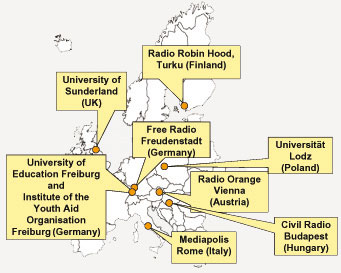
Crosstalk was designed and carried out by a team of 9 European partners in 7 countries which included community media practitioners, adult education specialists and university researchers (see list of partners on the right-hand side). The partnership represented an unusual combination of experience in education, training, broadcasting, research, project management and publication on community radio that is reflected in the various Crosstalk –teaching and learning materials. (link to materials for download)
Coordinator, Dr. Traudel Günnel, Senior Lecturer at Freiburg University of Education, led much the same team in previous projects (Digital Dialogues / META-Europe) funded under the Grundtvig programme.
The project was evaluated by Traudel Günnel, University of Education, Freiburg, Peter Lewis, London Metropolitan University, and Beatrice Barbalato, Mediapolis Rome.
project partners:
Elisabeth Samhaber, Nino Jaeger, Sushila Mesquita - Radio Orange Wien
Riitta Haapakoski - Radio Robin Hood (Turku)
Susan Jones - Free Radio Freudenstadt
Carmen Kunz - Scientific Advisory Institute /YouthAidOrg. Freiburg
Ádám Magyar - Civil Radio (Budapest)
Prof. Dr. Beatrice Barbalato Mediapolis - Rome
Dr. Wieslaw Oleksy - University of Lódz
Caroline Mitchell - University of Sunderland
Audio-Tours
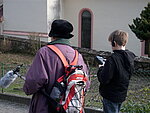 Das Projekt macht sich zunutze, dass Geschichten erzählen nach wie vor eine der wichtigsten Kontakt-Zugänge zwischen älteren und jüngeren Menschen ist. Traditionell erzählen die Älteren den Jüngeren etwas bzw. geben ihre Erfahrungen und ihr Wissen an die Jüngeren weiter. Hier erzählen jedoch auch die Jüngeren den Älteren von ihren Erfahrungen, gewähren Einblick in ihre Welt, so dass sich Ein- und Vorstellungen von der jeweils anderen Generation reflektieren und auch revidieren lassen. Die durch das Pilotprojekt in Freiburg-Ebnet entstandenen Kontakte hatten auch Folgen für die Alltagskommunikation: Eine Seniorin erzählte, seit dem Projekt würden die Kinder sie immer grüßen, wenn sie ihr zufällig begegneten. Einer der Schüler habe sich sogar gemerkt, wann sie Geburtstag habe und sei extra zu ihrem Haus gelaufen, um ihr zu gratulieren.... [zum Audioguide...]
Das Projekt macht sich zunutze, dass Geschichten erzählen nach wie vor eine der wichtigsten Kontakt-Zugänge zwischen älteren und jüngeren Menschen ist. Traditionell erzählen die Älteren den Jüngeren etwas bzw. geben ihre Erfahrungen und ihr Wissen an die Jüngeren weiter. Hier erzählen jedoch auch die Jüngeren den Älteren von ihren Erfahrungen, gewähren Einblick in ihre Welt, so dass sich Ein- und Vorstellungen von der jeweils anderen Generation reflektieren und auch revidieren lassen. Die durch das Pilotprojekt in Freiburg-Ebnet entstandenen Kontakte hatten auch Folgen für die Alltagskommunikation: Eine Seniorin erzählte, seit dem Projekt würden die Kinder sie immer grüßen, wenn sie ihr zufällig begegneten. Einer der Schüler habe sich sogar gemerkt, wann sie Geburtstag habe und sei extra zu ihrem Haus gelaufen, um ihr zu gratulieren.... [zum Audioguide...]
 Castelluccio Valmaggiore (1500 Einwohner/innen) ein kleiner Ort am Fuße der Berge Nordapuliens, liegt ca. 45 Km westlich von Foggia. Die Gegend ist landwirtschaftlich geprägt, Arbeitsplätze fehlen, junge Leute sehen sich oft gezwungen, die Gegend zu verlassen, um Arbeit zu finden. Doch Castelluccio ist ein lebendiger Ort. Hieran haben die Schulen vor Ort mit ihren aktiven Lehrerinnen und Lehrern einen nicht unbedeutenden Anteil. Zwei Schulen in Casteluccio Valmaggiore beteiligten sich an der Projektaktivität „Spielorte, ein Ortsrundgang für die Ohren“: die Primarschule Antonio Salandra und die Mittelschule Virgilio. [zum Audioguide (it)]
Castelluccio Valmaggiore (1500 Einwohner/innen) ein kleiner Ort am Fuße der Berge Nordapuliens, liegt ca. 45 Km westlich von Foggia. Die Gegend ist landwirtschaftlich geprägt, Arbeitsplätze fehlen, junge Leute sehen sich oft gezwungen, die Gegend zu verlassen, um Arbeit zu finden. Doch Castelluccio ist ein lebendiger Ort. Hieran haben die Schulen vor Ort mit ihren aktiven Lehrerinnen und Lehrern einen nicht unbedeutenden Anteil. Zwei Schulen in Casteluccio Valmaggiore beteiligten sich an der Projektaktivität „Spielorte, ein Ortsrundgang für die Ohren“: die Primarschule Antonio Salandra und die Mittelschule Virgilio. [zum Audioguide (it)]
Moving Stories
"Moving stories and Generations" targets senior citizens, children and young people focussing on inter-generational aspects. Designed by project partners from Germany and Italy for a media education project with different generations, the course deals with intergenerational communication and media training. The focus is on play and games, then and now. Senior citizens and children/young adults visit their favourite places, interview each other in turn and produce an audio guide, which takes the listener directly to the actual venues.
Get impressions of the audio tours that were produced within the Crosstalk project:
Freiburg-Ebnet (de)
Freiburg- St.Georgen (de),
Castelluccio Valmagiorre (it).
"Moving stories and Gender" targets women of different ages, social and cultural backgrounds. This course, too, is designed to be used with heterogeneous groups whose different backgrounds stimulate discussion and encourage self-articulation. Its focus is gender issues and the media. Course participants reflect on how women and men are generally represented and depicted? How does this affect their perception and understanding of their own gender roles? Another equally important aim has to do with empowerment – promoting participants’ skills and confidence, and encouraging them to take advantage of the options offered by media initiatives.
Project partners from Germany, Poland and Austria developed the ideas for the workshop conception and the teaching and learning materials for download. Although gender issues are the starting point for this workshop, the insights that can be gained in addressing them can be applied to a wide variety of topics and to the way they are presented. Both in terms of the topics addressed and the style of treatment, community media offer opportunities for constructive action toward gender equality.
“I wish this course could be offered in schools… to bring the subject closer to the youngsters and young people.” (one course participant from Germany who took part at the pilot course at Radio Freudenstadt/ Germany in 2009)
“Moving stories and Migration” targets migrants and asylum seekers focussing on intercultural aspects. The course is designed to be used with groups where differences in age/generation, gender orientation, social and educational background can stimulate discussion and encourage group members to tell their stories and define their identities.
Project partners from Finland, Hungary and the UK jointly designed the course and the teaching and learning materials, working with many different people who have experienced migration. Here you’ll find simple methods of confidence building and radio skills training that were developed to help people with a refugee background get on air. The handbook gives examples of how telling even a painful story can have a cathartic effect and how the use as trainers of those who have previously completed the course provides positive role models. “It was the first time to hear my voice on something.” (course participant from West Africa who took part at the pilot course in Sunderland/UK in 2009)

